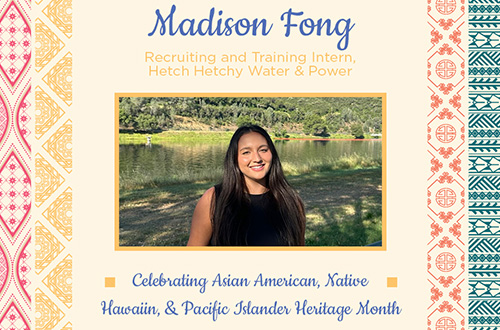“To me, Asian American, Native Hawaiian, & Pacific Islander (AANHPI) Heritage Month means honoring the work and sacrifices that the generations before me endured, so that I can be here now. It means taking the time to recognize the contributions that AANHPI people have made, and continue to make, and the unique perspectives we have to offer the world.”
Celebrating AANHPI Heritage Month
In May, the San Francisco Public Utilities Commission (SFPUC) celebrates the rich cultures and contributions of the AANHPI communities. We had a chance to talk with Madison Fong, a Recruiting and Training Intern for the SFPUC's Hetch Hetchy Water & Power (HHWP) Division, on the importance of celebrating AANHPI Heritage Month and what it means to her and her family heritage.

Madison’s AANHPI heritage comes from her great grandparents, who immigrated to the United States from Hong Kong. Her grandfather was a first generation Asian American, and she shares as the generations in her family have progressed in the US, the Chinese culture that her great grandparents brought with them began to disappear. “I like to honor my grandpa and great grandparents by asking questions about them and keeping their memories and traditions alive,” she explained. “I have a special connection to a Buddha statue that my great grandparents brought with them from Hong Kong.”
Diversity, Equity, Inclusion, and Belonging
Madison takes great pride in recruiting potential candidates to work at the SFPUC. She has helped develop a robust list of potential candidates to notify them of future job announcements. She is also involved in projects geared towards raising awareness in Diversity, Equity, Inclusion, and Belonging (DEIB) within the HHWP Division.
“I believe that it is essential that Asian American, Native Hawaiian, and Pacific Islanders are present and represented within the utilities industry because without having our voices heard, the utilities industry cannot operate with our best intent in mind,” she said. “This is true for all minorities within the SFPUC. By having the opportunity to be heard, we can have a say in how different decisions affect our communities.”


